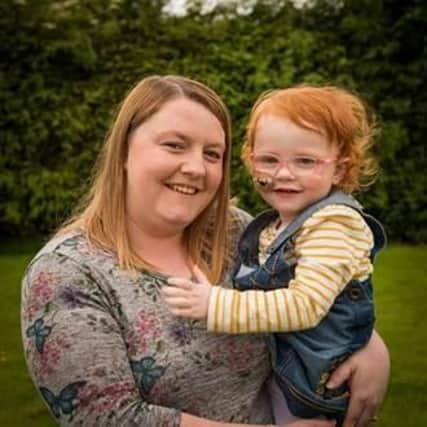Two NI mums of disabled children share how their caring responsibilities have left them burnt out, as they back call from charity Sense for greater respite support for families


Jacqueline Lipton is 26 and lives in Belfast with her partner Marty, 41. She cares for her daughter Leona, 3, who has brain damage, is visually impaired, is non-mobile and is tube fed.
Jacqueline is responsible for all of Leona’s care alongside her partner including preparing regular feeds through her feeding tube and keeping Leona’s body moving to prevent it getting stiff.
Advertisement
Hide AdAdvertisement
Hide AdThe only break Jacqueline and her partner get from caring is through a hospice stay for Leona for two nights, four times a year. As Leona often doesn’t sleep through the night these stays are vital for Jacqueline to be able to rest and recharge.


Jacqueline said: “I love Leona but I’m disappointed with the support for carers at the moment. There’s only us to care for Leona, there’s no other support or centres, no baby sitters. They would have to have specialist training and finding the right people to care for Leona is very hard.
“I see a lot of facilitates and activities in the community for children who aren’t disabled. We don’t have that. There are no facilities for Leona; I’m sad about that.”
Jacqueline is sharing her story as new research, published by the national disability charity, Sense, has laid bare the pressure on carers looking after disabled family members, with nearly two thirds describing themselves as exhausted and/or burnt out, with many delivering round-the-clock care without a break.
Advertisement
Hide AdAdvertisement
Hide AdAccording to the charity, that supports people with complex disabilities, family carers spend an average of 42 hours a week providing care and support to their loved ones, completing tasks such as personal care, feeding, dressing, lifting and giving medication.
Another mum, Josephine Armstrong, 31, from Belfast, said caring for her daughter Paige is a 24/7 job.
The seven-year-old who has mitochondrial disease, cannot wash or dress herself. Josephine also feeds her daughter through a tube and has to administer regular medicines and physiotherapy exercises, as well as constantly supervising Paige for seizures.
Josephine said: “The only time I really get a break is when hospice staff come over to the house for a few hours, to help Paige take a bath. I spend this time with my other three daughters and doing life admin that I struggle to do while looking after Paige at the same time. It doesn’t really feel like I get any me time.”
Advertisement
Hide AdAdvertisement
Hide AdJosephine said it is difficult to have a “normal life” as a family.
"We can’t go swimming, or to the cinema, or do forest walks together. I sincerely would love to have a break. I’m exhausted from the 24/7 care for Paige, plus the different school runs, the girls’ homework, the housework – it all takes its toll. But I am so grateful for my girls and that Paige is still with us. She’s such a character, she loves Peppa Pig, spending time with families, walking on the grass and playing with her light-up sensory toys.”
Sense said that despite the long hours, many carers are unable to take a break from their caring responsibilities. More than a third of carers said they don’t receive any support to be able to take a meaningful break, with one in five unable to remember the last time they could take a break.
The charity’s findings reveal that carers will most commonly use the time to catch up on household tasks, such as cleaning, catching up on sleep, and spending time with other members of the family or friends. More than a third use their ‘break’ to do paid work.
Advertisement
Hide AdAdvertisement
Hide AdIt said respite services are available for families, offering temporary care that lets a carer take a break from looking after their loved one. However, the support available varies widely across the UK, and some services paused during the pandemic have not resumed.
Carers cites affordabilit as the biggest barrier preventing them from accessing respite services. This is followed by a lack of clear information available on what services and support are available in the family’s local area and long waiting lists to access support.
Some say that services and support available don't meet the needs of the person they care for, while other factors include restrictive eligibility criteria and transport costs.
Sense said families’ needs are being neglected and is calling on national government to commit to long-term funding for specialist respite services, and for local authorities to improve its provision of information available for families so they know what is available.
Advertisement
Hide AdAdvertisement
Hide AdRichard Kramer, chief executive of Sense, said: “Caring for someone with complex disabilities is often demanding, non-stop work, and takes its toll physically and mentally. Yet sadly, family carers across the country are missing out on a being able to take a meaningful break from these responsibilities.
“The pandemic and now the cost-of-living crisis has made the situation worse, with carers taking on even greater caring responsibilities and receiving less support, with their health and wellbeing suffering as a result. Many are simply burn-out. We need to show that we value these incredible individuals in our communities. Local and national government must commit long-term resource and funding to support families.”
Visit www.Sense.org.uk/GiveCarersABreak